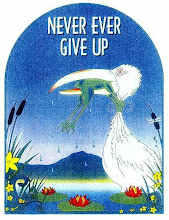With the sub zero temperature here there was no doubt the high probability of seeing Hoar frost.
~~
I wanted to take more pictures, but it was toooooooooooooooooooooo cold. I would aim at the object then my glasses would fog up and I couldn’t see what I was aiming at, HA. Then I would take the glasses off, but first had to take off my gloves, then by the time I was ready to AIM my hands were too numb to click. HA
~~
This day the low was minus 4, not sure what it was with the wind chill factor But Tell ya what it was mighty cold. The HIGH this day was a BALMY PLUS 9
~~
Oh well ;)
hoar+frost.jpg) Hoar-frost first turns up in written English in 1290 as hore frost. Strictly speaking, hoar-frost is the kind of frost that turns everything it forms upon white or gray. Due to the fact that hair turns gray with age, things that are white or gray are often associated with old age and this is the original sense of hoar. Old English har and Old High German her both meant "old" or, as a secondary meaning, "venerable, august".
Hoar-frost first turns up in written English in 1290 as hore frost. Strictly speaking, hoar-frost is the kind of frost that turns everything it forms upon white or gray. Due to the fact that hair turns gray with age, things that are white or gray are often associated with old age and this is the original sense of hoar. Old English har and Old High German her both meant "old" or, as a secondary meaning, "venerable, august".
e.jpg) According to Dictionary.com, the Online Etymology Dictionary says the word 'hoar', as it pertains to frost, "It is recorded in O.E. (hoar-frost is c.1290), expressing the resemblance of the white feathers of frost to an old man's beard." The word itself came from the Proto-Germanic (P.Gmc) word har meaning "grey, venerable, old". The Germans still retain this word in the form of Herr, which is a title of respect.
According to Dictionary.com, the Online Etymology Dictionary says the word 'hoar', as it pertains to frost, "It is recorded in O.E. (hoar-frost is c.1290), expressing the resemblance of the white feathers of frost to an old man's beard." The word itself came from the Proto-Germanic (P.Gmc) word har meaning "grey, venerable, old". The Germans still retain this word in the form of Herr, which is a title of respect.
e.jpg) Under clear frosty nights in winter soft ice crystals might form on vegetation or any object that has been chilled below freezing point by radiation cooling. This deposit of ice crystals is known as hoar frost and may sometimes be so thick that it might look like snow. The interlocking ice crystals become attached to branches of trees, leafs, hedgerows and grass blades and are one of the most prominent features of a typical 'winter wonderland' day. However, the fine 'feathers', 'needles' and 'spines' might also be found on any other object that is exposed to supersaturated air below freezing temperature.
Under clear frosty nights in winter soft ice crystals might form on vegetation or any object that has been chilled below freezing point by radiation cooling. This deposit of ice crystals is known as hoar frost and may sometimes be so thick that it might look like snow. The interlocking ice crystals become attached to branches of trees, leafs, hedgerows and grass blades and are one of the most prominent features of a typical 'winter wonderland' day. However, the fine 'feathers', 'needles' and 'spines' might also be found on any other object that is exposed to supersaturated air below freezing temperature.





hoar+frost.jpg)
e.jpg)
e.jpg)
e.jpg)
e.jpg)
e.jpg)
e.jpg)
e.jpg)
e.jpg)
e.jpg)
e.jpg)
e.jpg)
e.jpg)

e.jpg)
e.jpg)
e.jpg)

